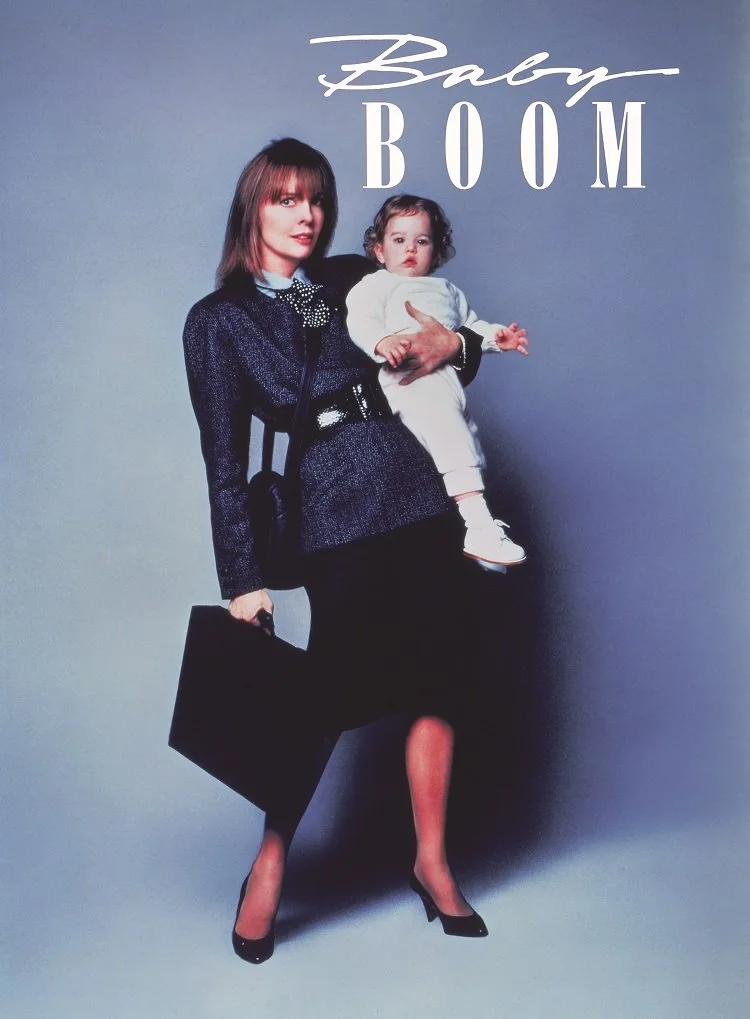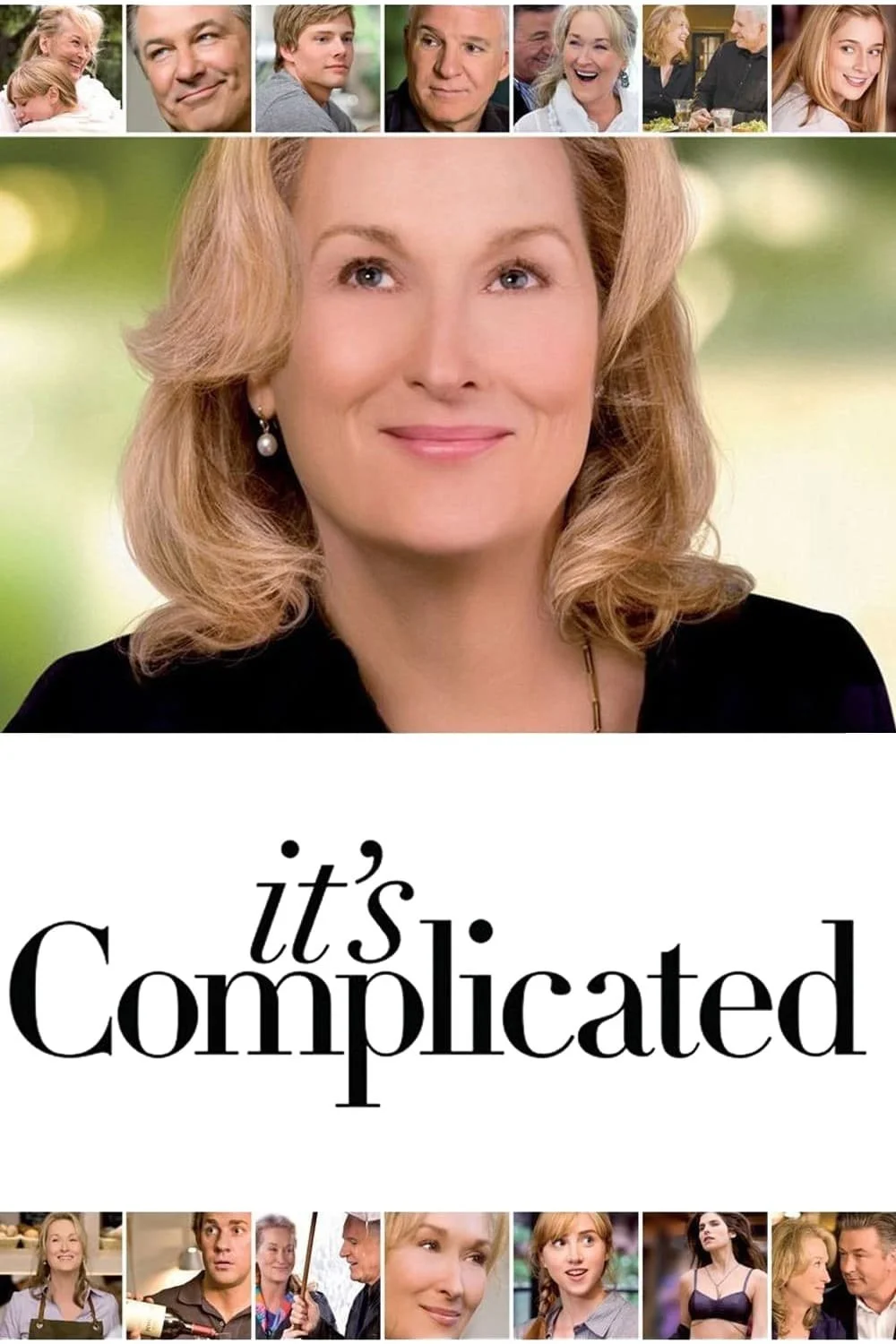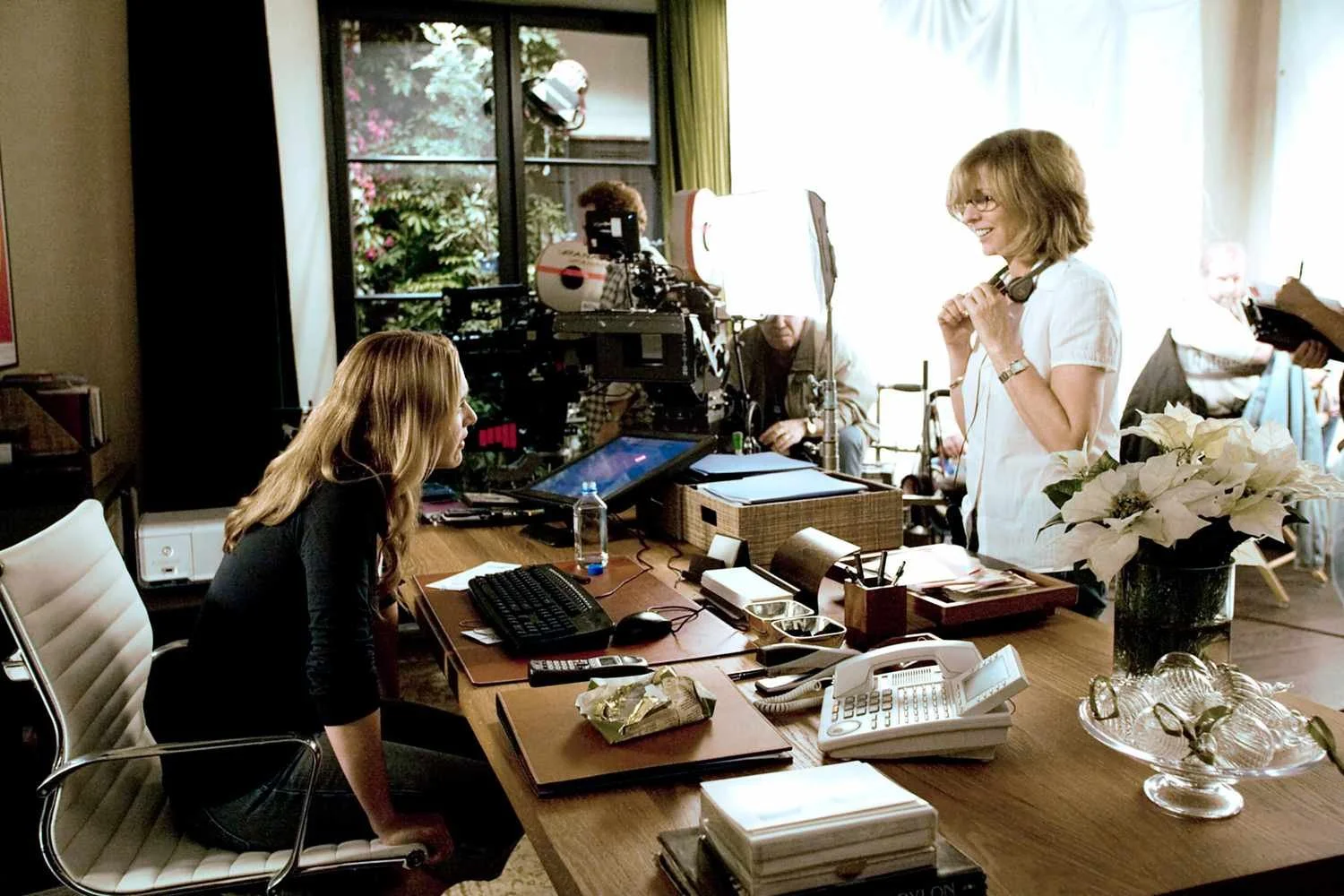NANCY MEYERS - THE ROMANTIC REBEL
by Minwa AK
Nancy Meyers is a rebel. Initially, one might be baffled at how “rebellion” can be used to describe the filmmaker and her films. Meyers is most well-known for romcoms…. and “rebellion” isn’t exactly a word that’s associated with the genre in any way. Most people that look for a rom-com would say they want something “cute” that can “fulfill their fantasies” and “help them escape”… While one might also look for something “realistic,” you’d rarely find someone who asks for something “rebellious”…. despite the fact that an actually realistic, honest film would also inherently be incredibly rebellious…. As are the films of Nancy Meyers.
To this day, society has a million contradicting “rules” for how women “should” live their lives. Any woman could list at least fifty off the top of her head at any given moment. Whether it’s in regards to her career, her love life, her looks, her age, her personality, and her preferences - there’s absolutely nothing a woman won’t be criticized for, and it’d be impossible for her to please everyone. Even if it seems farfetched to those reading it, these subconscious biases toward these beliefs exist in society. Nancy Meyers knows that, and she’s one of the few filmmakers that seeks to call that out truthfully… With everything said, that can sound like she sets out to make the loudest, most blatantly obvious feminist films with an almost nauseating amount of actually meaningless “girlboss” lines like some blockbusters today… but it couldn’t be farther from the truth or what Meyers conveys or depicts in her films and her style.
Meyers tells stories that seem to be relatively ordinary and one might assume they’d blend in with the rest of the films in the genre… but in actuality, Nancy Meyers’ films pack a nuanced punch - in every regard - be it romcoms, the works of female filmmakers, and even in the larger film landscape.
When Meyers began releasing her romcoms in the 1990s, the cinema landscape had been taken over with a cascade of meaningless romcoms and blockbusters that were purely made for profits or their stars. Care and consideration - which also means sincerity and integrity - were out the window in the genre, which is why we got fewer romantic comedies as the years passed on. Throughout it all, Meyers’ films thrived - and still stand the test of time today, when the waters of romantic comedies are hard to navigate with either outdated stories or meaningless, slang-filled ‘Gen-Z’ films that hold no narrative quality… it’s hard to find a truly good rom-com these days, and we still find ourselves going back to Meyers’…. why?
Meyers depicts and plays with the traditional perspectives and roles of men and women and their relationship with each other and love as a whole. That might sound meaningless since it’s something that’s been done ever since the very beginning of cinema in the early 1900s, and she surely isn’t the first one to do so - even in the romantic comedy genre, but Nancy Meyers films land because of her nuanced and honest take on the matter, primarily in regards to perspective.
Simply put, Nancy Meyers knows what women want (corny joke absolutltely intended).
Women are drawn to a Nancy Meyers film for the same reasons women then and now are still drawn to Jane Austen’s books. She…. gets it. The writer/filmmaker is a prime example of an artist understanding and depicting “the female gaze” - life through a woman’s point of view, including what real women think, find attractive, what they want to see in a film, in a significant other, and what they actually want in their lives. Sure, it can never apply to all women - but Meyers is one of the few filmmakers who fight to depict it truly, in any way she can. And in a sea of films and romantic comedies directed, produced, or written by men who think they know what women want? You bet it stands out. Take, for instance, Jack Black’s casting and character in The Holiday. With my love and respect for Jack Black, he might not seem like a person’s first pick for a male lead in a romantic comedy… but he works perfectly in The Holiday. He’s not what Cameron Diaz wants, but he’s exactly what Kate Winslet wants. He may not be the brooding, tough guy nor the classy gentleman Jude Law is in the film… but he’s a goofy, passionate, kind nerd that melted Kate Winslet’s heart, and it’s impossible not to fall in love with him, if that’s your type. On Jack Black’s casting, Meyers said: “I'm aware he's not Clark Gable, he's not ‘tall, dark, and handsome,’ but he's adorable, he's lovable. It's my way of saying this is the right kind of guy, this is what most guys look like if they're lucky. He's so adorable, and why not?”
The ‘why not’ is because Hollywood thinks women only want the brooding action heroes that actually might serve male fantasies more than they do women’s… but Nancy Meyers knows (us) better. Many women would gladly pick a Jack Black over a Clark Gable.
It’s one of the many ideas Meyers rebelled against in her career, but it isn’t the first. One might assume Meyers was only able to bend the rules and let out her rebellious nature later on in her career, but it’s something that was present from her very first feature - showing that it’s in her nature. After working as a story editor, she wrote a script for a comedy film together with Charles Shyer and Harvey Miller - Private Benajmin (1980). It was a film about a woman who enlists in the army after her husband passes away…. it was also a film that no studio wanted to produce and the star, Goldie Hawn, was told the film would kill her career. At the time, a comedy with a female lead and no male star was unheard of…. and it ended up as one of the biggest box office hits of 1980, with Hawn landing an Oscar nomination for her performance. A film about a woman in a male-dominated field who sought to prove herself…. sounds familiar. As does her later feature, 2000’s What Women Want - which depicted well… exactly what women want! (Okay, maybe we don’t want Mel Gibson, but a man who understands women, actually changes his ways once he realizes what women want and go through and how horrible he was in the past? Absolutely!) A real-life parallel to what Meyers’ must’ve thought and made happen, the film depicts a man in advertising reluctantly adapting his ways and his business by considering what women actually want - after coming across a game-changing woman in the industry who pushes for it…. A seemingly regular romcom that’s actually a stroke of genius on Meyers’ part, being one of the first films to blatantly discuss the “female gaze” and the differences between real women and how men perceive them to be.
Meyers’ most rebellious film was pulled directly from her personal life as well. One of the many aforementioned rules and long-held but twisted beliefs is that women of a certain age (or women who have reached a certain point in their lives) aren’t as worthy or aren’t as valued in society. For no sensible reason, older women are very easily deemed “too old” for pretty much anything and are thus incapable of starting a new job, falling in love, getting married, having kids, having fun - the list is endless…. and every entry is incorrect and frankly, stupid. The same is rarely said for men.
Once again, Nancy Meyers knows this and rebels. It’s perhaps the rule she’s most well-known and most beloved for breaking.
The iconic Something’s Gotta Give was a daring post-divorce comedy written and released right after her own divorce. It’s one of her most rebellious works, considering it's centered around, yes, divorcees, but specifically those who were above the age of 50. That might sound tame nowadays, especially considering we’ve gotten romcoms with older actors since then (such as last year’s Ticket to Paradise with George Clooney and Julia Roberts - Meyers’ impact on the industry is enormous), but at the time? It was enough for the film’s original studio, 20th Century Fox, to back out from producing the film.
In fact, two of Meyers’ films - Something’s Gotta Give (2006) and It’s Complicated (2015) - star two of Hollywood’s biggest and most talented actresses, Diane Keaton and Meryl Streep, respectively, when they were around 60 years old. (It’s worth noting that you might be able to consider another Keaton/Meyers collaboration as defying the norm in regards to age as the actress was 41 when Baby Boom was released, a film which centered around a working woman who raises a baby on her own… Even today, such roles for even 40-something-year-old women are rare, let alone those above the age of 50).
In these films, the 55+-year-old women are not just lovable but also desirable. They have agency and beauty. They are confident and successful. Age is never considered a hindrance to those factors or something that makes them “less than” - a contrast to the real-life situation in getting the films made. In fact, age is rarely even brought up in a negative light in a Nancy Meyers film. Even Jack Nicholson’s confusion and remarks towards Diane Keaton in Something’s Gotta Give turn to awe, all while being countered by Keanu Reeves’ pure infatuation with her character, in a way that has nothing to do with her age. It’s not some weird, psychological attraction - he’s just into her. After Nicholson accidentally walks in while Keaton’s character undresses, there’s no comment about her body from either of them. She’s slightly embarrassed, but of the incident rather than herself… so she’s a pretty confident woman (as she should be). The same thing goes for Meryl Streep in It’s Complicated. She’s simply having fun with Alec Baldwin and Steve Martin and trying to figure out her own feelings in life. Save for the fact that she plays a mother to grown adults, she’s just as lost and carefree as a twentysomething-year-old woman in other films and in life. When she’s gossiping and dishing with her friend group, it feels like they’re in their twenties or thirties too. It’s true to life and incredibly refreshing to see on screen.
These seemingly “little details” are not little at all and are what makes Meyers films so powerful and so uniquely hers. Even with her rebellious nature, all Nancy Meyers films are incredibly comforting. Love is at the center of all her films, but never solely in the romantic sense. The Intern (2015), the Father of the Bride films, and a classic everyone in my generation has a soft spot for, The Parent Trap (1998), are all films that depict different types of love that should be valued just as much as romantic love. But another, perhaps understated, reason why Nancy Meyers films are so comforting while also standing the test of time, is the director’s point of making them so, not just narratively, but visually and in relation to the dialogue as well. While some elements are bound to be outdated - such as mentions of the Blackberry phone or the Blockbuster store in The Holiday - they’re ineffectual details. For the most part, you can’t really tell when her films are set, and this is also stealthily achieved through the production design. Los Angeles in The Holiday is never “too LA” the same way England isn’t “too English” in the film - but the interiors are subtle enough to do all the work for you while also standing out to those with a keen eye (interior designers have literally been asked to emulate the sets of Meyers’ films). The creamy and neutral, traditional yet sleek, and tidy but lived-in sets emulate the characters’ lives and how real people want to live, playing a massive role in creating the “cozy” aesthetic present in most of her films. Credit must be given to the production designers as well, but at the end of the day, it is Meyers’ vision.
Everything about a Nancy Meyers film works because it’s honest storytelling from a writer/director who pays attention and is in touch with love, the world around her, and human nature. It’s proof that simplicity in storytelling, even in genre films, can have the greatest impact - if only it is genuine and true in its DNA. Nancy Meyers definitely stays within the conventions and tropes of romcoms, with happy endings and even the borderline fantastical male leads who grow as humans and reflect throughout the film…. I doubt many of those exist in real life. However, she bends any rule she can, and sticking to some conventions doesn’t negate the unique honesty and rebelliousness present in her work. As she puts it: “When you go to see the James Bond movie, you are pretty sure he's going to be alive in the end. There are conventions to every genre, it is just how well you do it. You try not to leave a trail, you try to be inventive with it.” Meyers’ innovation - through honesty and sincerity - is inherently rebellious and thus definitely left a trail, like the best rebels do.
“I try in my movies to keep them timeless, in a way. Like, I dress people in a way that will work in 20 years or 30 years and I don’t try to do a lot of references, or (include) the way people speak of the moment.” - Nancy Meyers
Pictured: Nancy Meyers and Kate Winslet on the set of The Holiday













